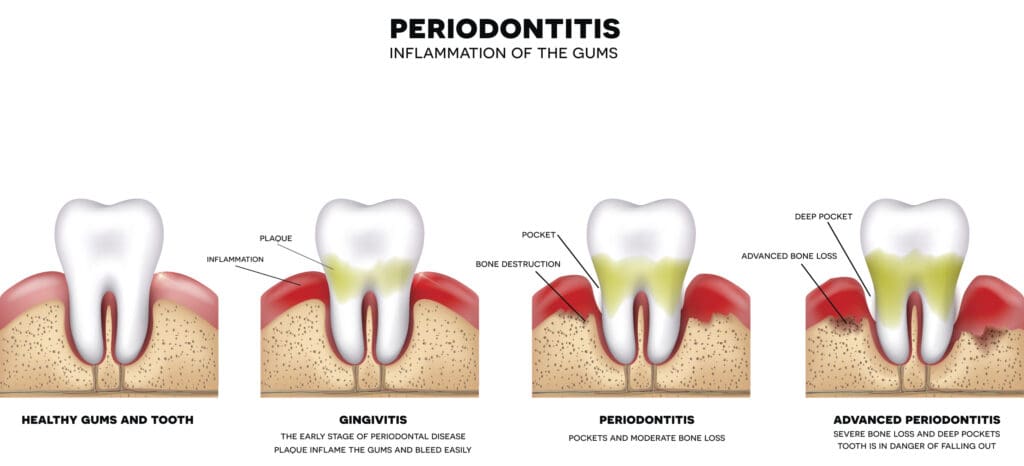Gum disease is a common problem that affects many people, but the good news is it can often be prevented and treated. Also known as periodontal disease, gum disease occurs when the gums around your teeth become infected and inflamed. If not treated, it can lead to serious dental issues, including tooth loss. Understanding what gum disease is, how it develops, and how to prevent it can help you keep your smile healthy for years to come.
Our Skokie periodontists can offer comprehensive diagnostics and care for all of your gum health-related concerns. These periodontal services are essential for identifying issues early and preventing long-term damage to your gums and teeth. We provide routine dental cleanings as part of an ongoing dental hygiene program, and can support patients with chronic gum disease through more targeted treatments. We personalize our care and our recommendations to meet your unique needs.

What is Gum Disease?
Gum disease begins when plaque, a sticky layer of bacteria, builds up on your teeth and gums. If plaque is not removed through regular brushing and flossing, it can harden into tartar, which can only be removed by a dentist or hygienist. The bacteria in plaque and tartar irritate the gums, causing them to become red, swollen, and bleed easily. This is known as gingivitis, the earliest stage of gum disease.
If gingivitis is not treated, it can progress to a more serious form of gum disease called periodontitis. In periodontitis, the infection spreads deeper into the gums and can even affect the bone that holds your teeth in place. As the disease worsens, it can cause gum recession, bad breath, and loose teeth.
What Are the Signs of Gum Disease?
Gum disease often develops slowly, and you might not notice it at first. However, there are several signs to watch out for:
- Red or swollen gums
- Bleeding gums when brushing or flossing
- Bad breath that won’t go away
- Loose or shifting teeth
- Gum recession or gums pulling away from your teeth
- Painful chewing or tenderness in your gums
- A bad taste in your mouth
If you notice any of these signs, it’s important to visit your dentist or periodontist as soon as possible. Early detection and treatment can prevent gum disease from getting worse.
What Causes Gum Disease?
The main cause of gum disease is poor oral hygiene, which allows plaque and tartar to build up on the teeth. However, other factors can also increase your risk. Smoking or chewing tobacco weakens your immune system, making it harder for your gums to heal. A diet low in nutrients, especially vitamin C, can increase the risk of gum disease as well.
Certain health conditions, like diabetes or heart disease, can make gum disease worse, and some medications can also contribute to gum problems. Genetics can play a role, too, as some people may be more likely to develop gum disease because of their family history. Hormonal changes, such as those during pregnancy, puberty, or menopause, can make your gums more sensitive to gum disease.
How Is Gum Disease Treated?
If you have gum disease, the good news is that it can be treated. The earlier the treatment, the better the outcome. Depending on the severity of the disease, treatment may include:
- Professional cleaning: A dentist or hygienist will clean your teeth to remove plaque and tartar.
- Scaling and root planing: This deep cleaning removes plaque and tartar from below the gumline and smooths the tooth roots to help the gums reattach.
- Antibiotics: In some cases, antibiotics may be prescribed to help fight infection.
- Surgical treatments: For more severe cases, surgery may be needed to restore the gums and bone.
How to Prevent Gum Disease
The best way to prevent gum disease is by taking good care of your teeth and gums. Brush your teeth twice a day with fluoride toothpaste and a soft-bristled toothbrush. Be sure to floss every day to remove plaque and food particles from between your teeth and below the gumline. Visiting your dentist regularly for checkups and professional cleanings will help keep your teeth and gums healthy. Eating a balanced diet rich in fruits, vegetables, and whole grains can help protect your gums. Avoid smoking and tobacco products, as these can make gum disease worse and make it harder for your gums to heal.
How We Can Help
At North Shore Periodontics and Implantology, we are dedicated to helping you prevent and treat gum disease. If you’re experiencing any symptoms of gum disease or just need a checkup, don’t hesitate to contact us. Our team is here to help you maintain healthy gums and a beautiful smile.
